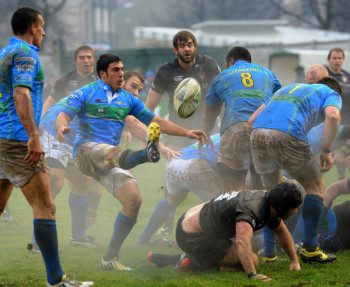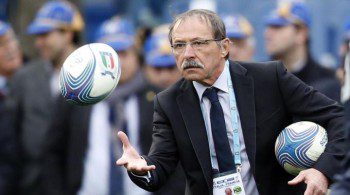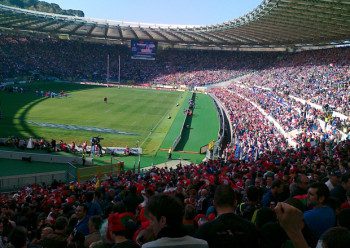 ROME, ITALY – Rugby Wrap Up is kicking off a weekly series, checking in on the state of the Northern Hemisphere’s rugby unions a year ahead of the World Cup. We should be posting every Tuesday from here on, so check back and see how your favorite nation stacks up. We’ll be profiling teams in reverse order of their finish in the most recent Six Nations tournament, so Wooden Spoon holders Italy will lead off.
ROME, ITALY – Rugby Wrap Up is kicking off a weekly series, checking in on the state of the Northern Hemisphere’s rugby unions a year ahead of the World Cup. We should be posting every Tuesday from here on, so check back and see how your favorite nation stacks up. We’ll be profiling teams in reverse order of their finish in the most recent Six Nations tournament, so Wooden Spoon holders Italy will lead off.

Domestic Game
Nobody was talking about Italy during the Pro12 fiasco, but if the Welsh regions had defected to the Aviva Premiership, it would have devastated the nation’s nascent development system at Treviso and Zebre. While the pair were the bottom two in last season’s table, both sides were doing more than making up the numbers. Treviso and Zebre won five matches each, in a season that saw Zebre run Ulster close twice, and beat the Ospreys at home. Treviso arguably took a step backward, but focusing purely on results ignores the more important developmental goal of the two sides. By providing a path for Italian players to play in a competitive environment on a weekly basis, Italian rugby is slowly but surely evolving into a self-sustaining entity. Looking at the national team’s roster, many of the stars that leap to mind (including Sergio Parisse and Martin Castrogiovanni) are not Italian, but Argentinian. The next generation of international players will actually have been born and raised in Italy, due in large part to the training provided by the much ridiculed Pro12 teams. In the modern game, the lack of funding for both Treviso and Zebre will preclude the teams from becoming truly competitive in the immediate future. However, the emergence of home grown internationals such as Alessandro Zanni and Edoardo Gori demonstrates that all is not lost for the domestic sides.

Coaching Situation
Jacques Brunel was hailed after the 2013 Six Nations, when it finally looked as though Italy was ready to take the next step as an international side. However, the team regressed badly in 2014, losing all five of its matches in the Northern Hemisphere’s showcase tournament, a run that included embarrassing margins of defeat to England and Ireland. While Brunel’s stated goal of reaching the quarterfinals at the 2015 World Cup seemed to be a truly attainable goal in the heady days of 2013, nine consecutive losses have put a severe damper on that prospect. Italy plumbed new depths during the June internationals, losing convincingly to Samoa and Fiji, while succumbing to Japan in an error strewn final match of the summer. Brunel’s job is probably secure through the World Cup, if only because naming a replacement after another disastrous Six Nations wouldn’t leave enough time for a new coach to put his stamp on the team. In the meantime, serious questions have arisen as Italian supporters and rugby pundits begin to wonder if Brunel is the man to take Italy forward.
National Team
Italy seemed to score a major coup when Tommaso Allen opted to become a member of the Italian national side, rather than playing for his native Scotland. However, Allen looked too young to succeed at the international level during the Six Nations, making some basic errors and playing poorly. He will be plying his trade in the French second tier next year, and Italy once more finds itself with an unsettled fly-half position. Most of Italy’s star players will be relatively old when the World Cup starts in 2015, with the fitness of Castrogiovanni, Parisse, and Marco Bortolami a particular worry. All three will be on the wrong side of thirty during the World Cup, and the trio are the most capped players in Italian rugby history. The forward unit has traditionally been Italy’s strength, but their backs have looked the more threatening in the past two years. Such terms are relative, as the Italians have struggled to maintain offensive momentum during their bleak period. Gori has had bright moment as a scrum half, while the Italians have a genuinely threatening back three in Venditti, Angelo Esposito, and Luke McLean.

Support
One of the best things to come of Italy’s elevation to the Six Nations has been the steady growth of the sport. The nation must be judged by a different standard than its Six Nations compatriots, lacking a true domestic structure and historic appeal. Benneton and Zebre have undeniably struggle to draw crowds, but the Stadio Olimpico has been packed for the past three years during the Six Nations, regularly hosting crowds of over 70,000. Infrastructure and investment remain a major (and seemingly insurmountable) issue at the moment, but for a sport that has spent so much time on the fringes of the Italian consciousness, the trend is unquestionably positive.
Overall
On the whole, Italy is in an awkward spot, with some promising talent in the pipeline, but a golden generation slowly aging. Of all the Six Nations sides, they will be the hardest pressed to advance, placed in a tough group with France and Ireland. Brunel and his charges will take heart from their victories over both teams in 2013, but the dream of a quarterfinal appears beyond reach for at least another cycle.
That’s it for now. Feel free to comment below, look for and “Like” our Facebook Rugby Wrap Up Page and follow us on Twitter@: RugbyWrapUp,Junoir Blaber, DJ Eberle, Nick Hall,James Harrington, Cody Kuxmann, Jaime Loyd, Karen Ritter , Jamie Wall, Jake Frechette and Declan Yeats, respectively.

